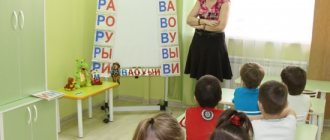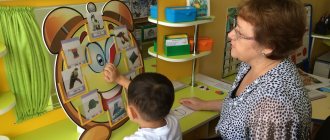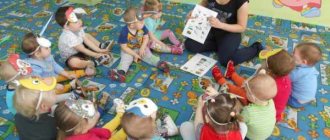Lexical topics in speech therapy practice
Often, in correctional work with children with speech disorders, speech therapists use the principle of thematic selection of educational material. Focusing on a specific lexical topic of educational tasks, didactic games and exercises makes it possible to develop generalization skills in children, enrich and activate vocabulary, and develop strong word formation and inflection skills. An adult teaches poetry to children, solves riddles, and performs exercises that promote general development within the framework of one lexical topic.
Why are lexical topics needed?
Teachers plan their work in such a way that preschoolers are taught a certain lexical topic for a certain period of time.
The content of all correctional work is based on the gradual expansion of children’s horizons, deepening and expanding the scope of knowledge in the context of the topic. The words that children become familiar with in class are repeated during games, in various everyday situations, and in the family when performing speech therapy tasks with parents. Learning is much more successful if didactic games and exercises on a specific lexical topic are used.
Through various games and exercises, children develop skills in forming and changing words. The ability to form words in different ways is very important in speech development because by mastering it, the child learns to distinguish and find a significant part in words, to see similar parts of different words. This skill is facilitated by such games as: “Say kindly”, “One is many”, “Which one?” Which? Which one?”, “Who has who?”, “Name the family.”
The games “What are they made of?”, “Say the opposite”, “Come up with a riddle”, “I’ll start, and you finish” help to consolidate knowledge about objects and their features, clarify children’s knowledge, and form specific and generic concepts.
Another number of games and exercises are aimed at developing in children the ability to correctly agree words in gender, number, case: “My, my, mine, mine”, “Count”, “What’s missing?” and others.
These games are an effective way to review and reinforce the grammatical skills children have acquired. All of them develop thinking and memory, and help increase attention span. Thanks to the curiosity and emotionality of children, you can repeat the same game over and over again, repeating the necessary words and consolidating them in speech.
Fiction plays a significant role in work on lexical topics. Texts for reading and memorizing with children are chosen so that they are accessible to the child’s understanding. By memorizing poems, children reinforce the correct use of various language forms when telling them. Fiction makes it possible to teach children to analyze the essence of what they read and enriches children’s vocabulary.
In the submenu of this section you will find the following for each lexical topic:
— vocabulary for children;
- exercises for coordination of speech and movement;
- poems, riddles, texts;
- games and exercises.
When performing the recommended tasks with your child, interest the child, use his favorite toys, and try to make learning an interesting and fun pastime.
Development and enrichment of vocabulary in preschool children
Bibliographic description:
Pavlova, I. Yu. Development and enrichment of vocabulary in preschool children / I. Yu. Pavlova.
— Text: direct // Pedagogical skills: materials of the I International. scientific conf. (Moscow, April 2012). - Moscow: Buki-Vedi, 2012. - pp. 212-215. — URL: https://moluch.ru/conf/ped/archive/22/1934/ (access date: 01/03/2022). Problems and tasks of speech development in preschool children have always been relevant. At all times, great attention has been paid to the development of children's speech. The importance of speech in the development of a child’s personality is so great that the tasks of its formation occupy a special place in education.
The word introduces a child to the world of people, helps to understand it and get used to it, helps to realize oneself as an individual and become an active participant in the life of society. The word is the child’s main means of communication and form of self-expression. It serves as a means of regulating his behavior. With the help of words, the child learns about the natural and objective environment.
In preschool age, a child must master a vocabulary that would allow him to communicate with peers and adults, study successfully at school, understand literature, television and radio programs, therefore preschool pedagogy considers the development of vocabulary in children as one of the important tasks of speech development.
A dictionary is the lexical composition of speech that a person uses. The dictionary is divided into active and passive. The volume of the active vocabulary of any person is less than the volume of the passive one.
The development of vocabulary during the normal development of a child is given in the table:
Quantitative growth of vocabulary according to Stern
| From 1 to 1.5 years | at 2 years old | at 3 years old | at 4 years old | at 5 years old |
| 100 words | 300-400 words | 1000 – 1100 words | 1600 words | 2200 words |
The data in the table shows that in preschool children, vocabulary development occurs especially quickly, like at no other age.
A special feature of a preschooler’s dictionary is its significantly smaller volume compared to an adult’s dictionary, since the volume of accumulated information about the environment is significantly inferior to the volume of knowledge of an adult.
For vocabulary development, constant communication between adults and children is important. The volume and quality (accuracy, imagery) of a preschooler’s vocabulary depend on how complete his communication is. Therefore, parents need to introduce their child to new objects, phenomena, and their names. It is important to talk with the preschooler, ask questions, and create situations in which possible shortcomings in the child’s understanding and use of words will be revealed. An active family lifestyle provides fertile material for expanding vocabulary: excursions to the theater, circus, zoo, etc.
As speech and thinking develop, the gradually expanding vocabulary is systematized, ordered, developing into semantic fields or formations of words united by meaning.
R.I. Lalaeva highlighted the following directions for the development of the dictionary:
- Dictionary expansion
- Clarifying the meaning of a word
- Development of the structure of word meaning
- Formation of semantic fields and lexical systematicity
- Expanding connections between words in the lexicon.
The method of speech development for preschoolers offers a type of activity that is structured in the form of a game. This facilitates the assimilation of material, develops auditory attention in children, and promotes correct speech perception.
Presenting material aimed at enriching the vocabulary in the form of a game teaches children to correlate a sound word with a picture or object, clearly pronounce simple and polysyllabic words, and answer questions.
The goal when conducting such classes is one: replenishment of vocabulary.
Teachers widely use didactic games, which not only allow for the comprehensive development of preschoolers, but also contribute to the development of vocabulary skills in children.
A didactic game is a multifaceted, complex pedagogical phenomenon: it is a gaming method of teaching preschool children, a form of education, an independent gaming activity, and a means of comprehensive education of a child’s personality. It is in didactic play that the child gets the opportunity to improve, enrich, consolidate, and activate his vocabulary.
Depending on the material, didactic games can be divided into three types: games with objects (toys, natural materials, etc.), printed board games and word games. It should be noted that all of these games can be successfully used to activate the vocabulary of preschoolers. Games with objects are most accessible to children, since they are based on direct perception, correspond to the child’s desire to act with things and thus get acquainted with them, in addition, the child willingly names the objects he sees.
The child begins to play these games at an early age and does not lose his interest in them throughout preschool childhood. In early preschool age, many games with toys are accompanied by movements, which corresponds to the characteristics of the child’s perception and thinking
The most complex are verbal games: they are not associated with the direct perception of an object; in them, children must operate with ideas. These games are of great importance for the development of a child’s thinking, since in them children learn to express independent judgments, draw conclusions and conclusions without relying on the judgments of others, and notice logical errors.
Verbal games are carried out mainly in older groups and are very important for preparing children for school, as they require and, therefore, develop the ability to listen carefully, quickly find the right answer to a question, accurately and clearly formulate their thoughts, and apply knowledge.
A didactic game as a form of teaching children contains two principles: educational (cognitive) and gaming (entertaining). The teacher is both a teacher and a participant in the game. He teaches and plays, and children, while playing, learn.
Game techniques for developing vocabulary in young children:
Game: "Cold - Hot."
Target:
Enriching your vocabulary with nouns
Content.
The adult asks the children to close their eyes, then hides the object and asks the question: “Where is the bear?” Children look for an object in the room at the prompt of an adult: “It’s cold. Colder. Warmer. Even warmer. Hot". A game of searching for a missing object helps children remember a new word.
Game: “Describe the object.”
Goals:
Expanding the vocabulary of adjectives, forming ideas about the subject.
Content.
An adult examines an object and points out its signs. For example, an adult examines an apple. It is yellow in color. The shape resembles a ball (it clasps the apple with the hands), the apple is round. It is large in size. If you stroke an apple, you feel that it is smooth. I press on the apple, nothing happens to it. The apple is hard. I’ll smell the apple: oh, how fragrant and fragrant it is. I’ll hold it in my hand and weigh it: the apple is heavy. I’ll cut a piece and taste it: the apple is sweet (sour, sweet and sour).”
Game "Wonderful bag"
Goals:
Expanding the volume of vocabulary, developing tactile perception, clarifying ideas about the characteristics of objects.
Equipment.
An elegantly decorated bag, small toys, the names of which belong to the same lexical group (“Dishes”, “Vegetables”, etc.)
Content.
First, children get acquainted with toys whose names belong to the same lexical group: they examine, name, and highlight their qualities. The first player puts his hand into the bag, feels for one toy, recognizes it and calls it: “I have a cup.” Only after these words can the child take the toy out of the bag, examine it and show it to all the children. If the answer is correct, the child takes the object for himself. Players take turns recognizing by touch, naming and removing objects from the bag. The one who collects the most toys wins.
Complicated version
(for older preschoolers): before taking an object out of the bag, it is required to determine its shape (round, oblong), the material from which the object is made (rubber, metal, rag, wood, plastic), the quality of the surface (smooth, rough, slippery) , cold).
Game “Mail”, “Decorate the Christmas tree”, “Magic tree”, “Thematic lotto”, “Dominoes”
Game "Parcel"
Goals:
Expanding the volume of the vocabulary, clarifying ideas about the characteristics of objects, developing coherent speech.
Equipment. Items, boxes according to the number of players.
Content. Each child receives a “parcel” (a box with an item inside). The first player begins to describe his item without naming or showing it. The item is presented after it is guessed.
Game "Analogies"
Goals:
Activation of nouns with a general meaning, development of understanding of generic relations between words (development of the conceptual component of the lexical meaning of a word)
Content.
The adult invites the children to complete the word according to the example: fox is an animal, crane is a bird, or vice versa. The adult names a word of general meaning, the child comes up with a word of specific meaning (or vice versa): dishes - frying pan, flowers - dandelion, transport - truck, fish - catfish, insects - grasshopper. The one who never gets lost wins.
Game "Edible - Inedible"
Goals:
Development of the ability to highlight the essential features of an object (edibility, animation, etc.), clarification of the meaning of generalizing words, development of auditory attention, general motor skills.
Content.
The presenter says the word and throws the ball to one of the players. If a food item, fruit or other edible object has been named, the player needs to catch the ball. Otherwise, the player dodges the ball. The games “Living - Non-Living”, “Vegetables-Fruit”, “Wild Animals - Pets”, “Birds - Insects”, “Clothes - Shoes”, etc. are played in a similar way.
Game "I Know Five..."
Goals:
Activation of words with a general meaning, development of understanding of generic relationships between words (development of the conceptual aspect of the meaning of a word).
Content.
Children stand in a circle. The first player, who has the ball in his hands, begins the game with the word: “I” and passes (throws) the ball to the child standing next to him. The second player receives the ball, says the following word: “I know,” and passes the ball on. Third player: "Five." The next child of the Insects. Then each move is accompanied by the naming of one insect until five words of this group are named. The game continues.
Ball game "Associations"
Goals:
Expansion of vocabulary, development of speech associations, general motor skills.
Content.
The adult throws the ball to the child and names a specific feature of the object: “Red.” The child catches the ball, adds a word denoting an object that has this attribute (mac0), and returns the ball to the adult. Similarly: heavy - truck; prickly hedgehog, cold snow, tall - man, glass - glass.
It is possible to conduct a game based on the material of a specific lexical topic (with or without support from pictures). In this case, the adult agrees with the child that he needs to come up with words on a certain topic (for example, on the topic “Dishes”). In this case, corresponding pictures can be presented on the typesetting canvas. Approximate lexical material: deep - plate; blue - pan; small saucer; transparent - jug.
Game “I collected in the garden...”
Goals.
Expansion of vocabulary, development of auditory memory.
Content.
The adult starts the game by saying the sentence: “I picked cucumbers from the garden.” The child repeats the entire phrase and adds the name of his vegetable: “I picked cucumbers and tomatoes from the garden.” The next player repeats everything said by the previous participant and comes up with a third vegetable: “I picked cucumbers, tomatoes and onions from the garden.” Players participate in the game until the first mistake. The winner is the one who remains in the game last. Depending on the lexical topic, the sentence changes in content: “I collected... in the garden,” “I put it in the closet...”, “I saw on the street...”, “He lives in the forest...”, “In the kitchen there is...” » etc.
Game “Say it with another word”
Goals.
Formation of semantic fields, expansion of the dictionary of synonyms.
Content.
An adult names a phrase and asks a question: “Throw the ball. How can this action be called differently, in another word?” Samples of correct answers are given: “Throw the ball - throw the ball. Looking out the window - looking out the window." Children begin to select synonyms only after confirming their understanding of the task.
Ball game "Say the opposite"
Goals.
Formation of semantic fields, expansion of the dictionary of antonyms.
Content.
Children stand in a line facing the leader. The adult (leader) says the word and throws the ball to one of the players. The person who catches the ball must name the antonym (the word “enemy”) to the given word and return the ball to the leader. If the paired word is chosen correctly, the child takes a step forward. The winner is the one who quickly approaches the conditional line on which the leader is located. This child continues the game by inventing his own words.
Literature:
- Alekseeva M.M., Yashina V.I. Methods of speech development and teaching the native language to preschoolers. – M.: 2000.
- Bondarenko A.K. Word games in kindergarten. – M.: 1974
- Borodich A.M. Methods for developing children's speech. – M.: 1981
- Kolunova L.A., Ushakova O.S. Work on words in the process of speech development of older preschoolers // Preschool education. 1994 No.9.
- Sokhin F.A. Speech development in preschool children. – M.: 1984
- Tikheyeva E.I. Children's speech development. – M., 1992
- Udaltsova E.I. Didactic games in the education and training of preschool children.-M.: 1976.
- Ushakova O.S. Speech development classes in kindergarten. – M.: 1993
- Ushakova O.S. Speech development of a preschooler. – M., 2001
- Ushakova O.S., Strunina E.M. The influence of vocabulary work on the coherence of speech // Preschool education. – 1981 No. 2.
- Elkonin D.B. Child psychology. – M., 1999
- Shvaiko T.S. Games and play exercises for speech development. – M.: 1983
Key terms
(automatically generated)
: child, game, word, object, vocabulary, ball, vocabulary expansion, adult, player, content.
Visual didactic material for lexical topics in the speech therapy group of preschool educational institutions
Verbal and didactic material on lexical topics (1 period)
Author: Irina Mikhailovna Gudova
Organization: MBDOU combined kindergarten No. 4
Locality: Krasnodar region, st. Leningradskaya
Author: Lyubov Grigorievna Slavko
Organization: MBDOU combined kindergarten No. 4
Locality: Krasnodar region, st. Leningradskaya
The manual summarizes and systematizes the practical experience of teachers in correcting oral speech deficiencies in children with general speech underdevelopment. This manual includes selected lexical topics: a set of didactic games; exercises to develop breathing, facial muscles, and to develop articulatory, fine and gross motor skills; poems for memorizing, riddles, tongue twisters, proverbs; texts for retelling. Didactic games and exercises will help children with speech disorders overcome difficulties in mastering the grammatical structure of the Russian language. The methodological manual will help to generate interest in classes, create positive motivation in children to solve many speech therapy problems and increase the effectiveness of speech therapy. The manual is intended for teachers of compensatory groups for children with special needs and general developmental groups of preschool educational institutions, speech therapists, as well as parents of preschool children.
- file0.docx.. 217.3 KB
Published: 11/01/2018
My applications
Diploma from the author of the magazine “Modern Lesson”
Diploma of the competition participant
© 2022, All-Russian pedagogical magazine “Modern Lesson” Author. sign C56, ISSN: 2713 – 282X, UDC 371.321.1(051), BBK 74.202.701 License for educational activities No. 039439 dated 06/10/2018 issued by the Department of Education of Moscow Media EL No. FS 77 – 65249 dated 04/01/2016 For letters : 125222, Moscow, PO Box 8 Phone E-mail:
MAGAZINE Preschooler.RF
Enriching children's vocabulary with vocabulary related to the work of adults as an integral part of vocabulary work in preschool educational institutions.Spiridonova Anna Vyacheslavovna Teacher of the MKDOU "Bolshemurtinsky kindergarten No. 1" p.g. t. Bolshaya Murta, Krasnoyarsk region
In modern science, vocabulary work is considered as a purposeful pedagogical activity that ensures the effective development of the vocabulary of the native language by children. The development of a dictionary is understood as a long-term process of quantitative accumulation of words, mastering their socially assigned meanings and developing the ability to use them in specific communication conditions.
Vocabulary work in kindergarten is a natural expansion of children’s active vocabulary through words that are unfamiliar or difficult for them.
The peculiarity of vocabulary work in preschool educational institutions is that it is carried out in the process of all educational work with children, including in the classroom. It is important that the assimilation of new words does not occur spontaneously, but systematically, so that the teacher manages this process and thus makes it easier for children, ensuring the correctness and completeness of assimilation of words.
One of the areas of speech development is enriching children’s vocabulary. This is the assimilation of those new words that children did not previously know at all, or new meanings of words.
The enrichment of the dictionary occurs, first of all, due to commonly used vocabulary (names of objects, signs and qualities, actions, processes, etc.). Children's vocabulary is enriched on the basis of their direct familiarization with the surrounding reality, in the process of cognitive activity.
At a young age, preschoolers begin to be introduced to the work of adults, and on this basis, the corresponding vocabulary is introduced, denoting the names of professions, labor actions and operations, and the results of labor.
The accessibility of knowledge about labor is determined by the proximity and accessibility of this type of labor to the observation of children, the vivid expression of operations and results of labor, and the orientation that is intelligible to the child. In this regard, already in the second year of life, the nanny’s work is observed and the names of some of her work actions are mastered (sweeping, washing, watering), etc. In the third year, the set of professions with which children are introduced expands, and corresponding words: cook, nanny, doctor, hairdresser, driver.
The content of knowledge about labor is deepened, in accordance with this, the dictionary is replenished with the names of labor actions (the cook cuts, fries, prepares dinner; the hairdresser cuts, combs the hair) and the names of the results of labor (tonsured, cured, prepared dinner, etc.).
In middle age, the content of children's familiarization with the work of a nanny, cook, janitor, and driver significantly expands and deepens. For the first time, an introduction to the work of a laundress and a salesperson is introduced. During GCD, knowledge and ideas about labor actions and labor processes, tools, machines that facilitate and speed up human labor, materials, results, and the significance of labor are formed.
In the fourth year, the expansion of children's vocabulary is ensured by familiarization with new professions of people (teacher, music worker, kindergarten manager, salesperson, builder) and their work operations (a teacher works with children, plays, reads to them; a music worker plays the piano, teaches them to sing, dance, etc.).
Increasing knowledge about work involves becoming familiar with people's attitudes in work and towards work and is accompanied by the introduction of words denoting the qualities of labor actions and relationships (the driver works quickly, the driver drives the car carefully, the nanny carefully wipes the flowers, etc.).
A wider range of profession names is introduced into the vocabulary of children aged five. This includes the professions of people working in transport (driver, pilot, captain, sailor, driver, conductor), professions of parents (teacher, postman, tailor, etc.). In addition to the names of labor actions and their qualities, the relationships of people in work, the names of labor equipment are introduced into the children's dictionary (for a cook - pots, scales, knives, frying pans, etc., for a janitor - a scraper, hose, shovel, etc.).
Familiarizing children with the work of people in the named professions makes it possible to show the main thing in the content of work, to teach them to understand the content of some of its components (for example, what are labor actions, what labor actions constitute the work of a cook, etc.). Having mastered all the components of the labor process by the senior preschool age, children will more easily acquire knowledge about other professions.
In the sixth year of life, the dictionary is replenished with the names of a wider range of professions working in construction (crane operator, mason, painter, electrician), on a collective farm (tractor driver, milkmaid, combine operator), in a tailoring shop (tailor, cutter, seamstress), etc. Here the names of different types of equipment that facilitate and speed up work are widely introduced into the dictionary (potato peeler, electric meat grinder, vegetable slicer, vacuum cleaner, floor polisher, washing machine, excavator, crane, tractor, bulldozer, snow blower, etc.). In addition, preschoolers are shown people’s attitudes to technology, to work and in work, and are introduced to the appropriate vocabulary: diligently, harmoniously, amicably, skillfully, carefully, etc.
The dictionary for children in the seventh year of life includes the names of a wide range of professions common in the area: professions in agriculture (milkmaid, tractor driver, combine operator, etc.), in transport (machinist, dispatcher, etc.), in construction (bricklayer, assembler, crane operator, painter, etc.), in factories, mines, military professions, professions related to serving the population, and others. Preschoolers' knowledge about work is generalized: they are introduced to the social orientation of all types of work and the attitude towards working people. On this basis, generalized ideas about work in our society are formed, and the corresponding vocabulary is introduced: work is an honorable, necessary thing; work for the benefit of everyone.
As a result, children accumulate a significant amount of knowledge and an appropriate vocabulary, which ensures their free communication. This dictionary is characterized by a variety of topics; all parts of speech are represented in it, which makes it possible to make a child’s speech at the end of preschool childhood meaningful, quite accurate and expressive.
For my children of middle preschool age, I developed a system of didactic games to enrich the children's vocabulary with vocabulary related to the work of adults. This system includes games such as: “Name the profession” (goal: to consolidate the names of professions), “Professions” (goal: to correlate nouns with verbs), “Name assistant objects” (goal: to get acquainted with the tools of labor and to consolidate the names of the tools labor), “What does anyone need?” (task: to teach how to relate tools to people’s professions; to cultivate interest in the work of adults, the desire to help them, to take on the roles of people of different professions in creative games), “Let’s put on a doll for work” (goal: to teach children to relate work clothes to a person’s profession , name the corresponding professions), “From word to word” (goal: teach children to consistently name objects of labor and select a picture depicting a person of the corresponding profession), “Wonderful chest” (goal: remember what tools people of different professions use), “Let's go to work" (goal: to teach children to navigate the space of the room, to find their place in accordance with visual landmarks - pictures depicting professional symbols), "Choose a word" (goal: to consolidate the names of professional qualities), "Who does what" ( goal: to consolidate the names of actions performed by people of different professions), “Who knows more professions” (goal: to teach children to relate the actions of people with their profession, to form corresponding verbs from nouns (builder - builds, teacher - teaches, etc.), “Professions” (goal: consolidating the names of professions and the actions that are performed by them), “Travel around the city” (task: consolidating knowledge about your hometown: who lives in it, works, what kind of transport, how it is decorated), “Workshop of amazing professions” (goal: the game provides the child with the opportunity to fantasize, turn to the help of adults, an educational book or TV show. A solution can not only be found, but also invented, which means that the boundaries of ideas about professions are expanded. Children learn to think outside the box, develop imagination, speech, communication skills, logical and figurative thinking, and activate attention and memory).
Thus, we can conclude that as a result of using the developed system of didactic games, the vocabulary of children of middle preschool age is enriched with vocabulary related to the work of adults.
| Next > |
KCard index. Dictionary for lexical topics in the senior speech therapy group
Card index. Dictionary for lexical topics in the senior speech therapy group
Viewing the contents of the document “Kartoteka. Dictionary for lexical topics in the senior speech therapy group"
Card index Dictionary for lexical topics in senior speech therapy group
Speech therapist Lobova T.V.
1. "Kindergarten"
Dictionary: Nouns: (Kindergarten), group, bedroom, locker room, office, laundry, kitchen, office, hall, director, speech therapist, teacher, assistant teacher, Kazakh language teacher, music worker, physical education instructor, cook, laundress, nurse, driver , watchman
Adjectives: children's, speech therapy, medical, director, methodological (office),
Verbs: study, draw, sculpt, tell, count, give injections, give vitamins, cook (dishes), wash, hang, iron, guard, transport, wash,
2.»Toys«.
Nouns: toys, ball, car, cubes, doll, pyramid, machine, construction set.
Adjectives: wooden, plastic, soft, glass, paper, iron, metal, rubber. Verb: roll, carry, feed, build, wash, clean, lay, assemble.
3. "Vegetables."
Nouns: tomato, cucumber, onion, carrot, cabbage, vegetable.
Adjectives: red, yellow, green, hard, soft, big, small, sweet, bitter, round, oval. Verbs: hang, ripen, collect, dig, pluck.
Nouns: Orchard, apple, pear, plum, peach, apricot, grape, fruit. adjectives: ripe, ripe, juicy, fragrant, appetizing, smooth, red, orange, yellow, green, blue, blue, violet, pink, brown.
Verbs: hang, ripen, collect, dig, pluck.
Nouns: Slush, fog, leaf fall, frost, hoarfrost, autumn, September, October, November, month.
Adjectives: Early, late, beautiful, rich, sad, scarlet, golden, crimson. Verbs: Fall, fly, rustle, rustle, drizzle, clean up, fly away, wither, dry, turn yellow, blush.
6. “Trees and shrubs.”
Vocabulary: Nouns
: tree, bush, maple, birch, rowan, spruce, pine, aspen, oak, lilac, rose hip, hawthorn, trunk, branch, root, leaf, fruit, cone, earring, lionfish, needle, thorns. Adjectives: tall, low, thick, thin, yellow, red. Verbs: hang, fall, spin, lie, dry, rustle, turn yellow, turn red.
7. "My family."
Nouns
: family, relatives, son, daughter, grandson, granddaughter, aunt, uncle.
Adjectives:
old, young, stupid, smart, tall, short, plump, thin, cheerful, sad, dear.
Verb:
care, respect, work.
Adverbs:
fun, loud, quiet, sad, fast, slow.
8. “I am human. Body parts. Human objects."
Vocabulary: nouns: Face, forehead, eyebrows, eyelids, eyelashes, cheeks, chin, neck, ears, head, palm, hand, fingers, little finger, body parts, head, neck, torso, arm, leg, finger, eye , mouth, nose, ear, lip, hair, child toiletries: comb, scarf, (tooth)brush,
Adjectives: Large, index, middle, ring, right, left, brown, blue, gray, green, tall, low, long, short, tooth, nasal, towel, washcloth, soap. Verbs: squint, frown, blink, bite, smile, laugh, get angry, walk, run, jump, lie. comb, wipe, wash.
Adverbs: up, down, left, right.
Nouns: address, kitchen, living room, hallway, children's room, bedroom, office, bathroom, floor, entrance, stairs, mason, crane operator, plasterer, painter, carpenter, roofer, axe, plane, saw, hammer, trowel, brush, shovel, slab, brick, (lifting) crane, mortar, nail.
Adjectives: necessary, useful, difficult, lifting (crane), cozy, warm, multi-storey, high, low.
Verb: build, plaster, paint, make, cover, saw, hammer.
Adverbs: diligently, harmoniously, skillfully, quickly, amicably
10. "Furniture, electrical appliances."
Vocabulary: Nouns: Furniture, armchair, sofa, bed, wardrobe, sideboard, sideboard, wall, chair, cabinet, leg, door, shelf, back, armrest, seat; electrical appliances, refrigerator, vacuum cleaner, iron, mixer, curling iron, microwave oven, electric stove.
Adjectives: oak, birch, walnut, pine, soft, mirror, leather, polished, iron, plastic, electric, metal.
Verb: put, put, sit, sleep, lie, rest, vacuum, freeze, fluff, iron, iron, bake, warm.
11. "Dishes"
Dictionary:
Nouns: Dishes, tray, kettle, cup, saucer, glass, coffee pot, sugar bowl, candy bowl, milk jug, butter dish, salt shaker, tureen, plate, napkin holder, spoon, fork, knife, ladle, saucepan, frying pan, ladle, colander; wall, bottom, lid, handle, spout, kettle, pan, cup, plate, spoon. Adjectives: Glass, porcelain, metal, cast iron, enameled, tea, table, kitchen. Verbs: Wash, clean, wipe.
12. “Food”.
Milk, cheese, butter, meat, sausage, eggs, fish, bread, sugar.
Adjectives: Sweet, white, yellow.
Verbs: pour, cut, cook, fry
13. "My Kazakhstan"
Nouns: state of Kazakhstan, coat of arms, flag, anthem, Astana, capital, Almaty (old capital), city, Kostanay, avenue, street, monument, school, hospital, plant, factory, library, river, Tobol. Adjectives: Handsome, dear, beautiful. Verbs: stand, flow, spread out.
14. "Pets."
Vocabulary: Nouns: cow, horse, cat, dog, calf, foal, kitten, puppy, hooves, mane, wool, muzzle, claws, horns, tail, animal.
Adjectives: Warm, thick, thick.
Verbs: Feed, water, clean, care
15. "Poultry"
Vocabulary: Nouns: rooster, hen, chickens, goose, goose, goslings, duck, ducklings, turkey, turkey, poults.
Verb: swim, peck, quack, crow, cackle.
16. "Christmas tree holiday."
Vocabulary: nouns: Bear, fox, hedgehog, hare, squirrel, wolf, animal, claws, needles, wool
Adjectives: Wild, sharp, prickly, soft, gray, fluffy, brown, white, red.
Verbs: Build, search, stock up, goes, runs, gallops, jumps.
Adverbs: frosty, snowy.
Vocabulary: Nouns: Frost, blizzard, snowfall, snowdrift, snow
Adjectives: White, fluffy, cold, snowy.
III period of study
1. Completion of sound production in accordance with the examination data.
2. Syllable structure. Consolidating the pronunciation of 4-5 difficult words. Using them in sentences and texts.
3. Sound analysis. Strengthening the skill of analysis and synthesis of monosyllabic words such as soup, cat, poppy.
Approximate distribution of speech therapist and teacher activities
| Days of the week | Class time | Name of classes | Who conducts |
| I period | |||
| Monday | 9.00 – 9.20 9.30 – 9.50 9.00 – 13.00 evening | Design, modeling Music Individual lessons Drawing | Teacher Music worker Speech therapist Teacher |
| Tuesday | 9.00 – 9.20 9.30 – 9.50 10.00 – 13.00 evening | Speech therapy classes - 1 subgroup Mathematics - 2 subgroup Speech therapy classes - 1 subgroup Mathematics - 2 subgroup Individual lessons Speech development | Speech therapist Educator Speech therapist Educator Speech therapist Educator |
| Wednesday | 9.00 – 9.20 9.30 – 9.50 9.00 – 13.00 | Application Physical education Individual lessons | Teacher Teacher Speech therapist |
| Thursday | 9.00 – 9.20 9.30 – 9.50 9.00 – 13.00 | Speech development Music Ind. classes | Teacher Music worker Speech therapist |
| Friday | 9.00 – 9.20 9.30 – 9.50 10.00 – 13.00 evening | Speech therapy classes – 1 subgroup Mathematics – 2 subgroup Speech therapy classes – 1 subgroup Mathematics – 2 subgroup Individual lessons Physical education | Speech therapist Educator Speech therapist Educator Speech therapist Educator |
| II period | |||
| Monday | 9.00 – 9.20 9.30 – 9.50 9.00 – 13.00 | Design, modeling Music Individual lessons | Teacher Music worker Speech therapist |
| Tuesday | 9.00 – 9.20 9.30 – 9.50 10.00 – 13.00 evening | Speech therapy classes – 1st subgroup Mathematics – 2nd subgroup Speech therapy classes – 1st subgroup Mathematics – 2nd subgroup Individual lessons Drawing | Speech therapist Educator Speech therapist Educator Speech therapist Educator |
| Wednesday | 9.00 – 9.20 9.30 – 9.50 10.00 – 13.00 evening | Speech therapy classes – 1 subgroup Application – 2 subgroup Speech therapy classes – 1 subgroup Application – 2 subgroup Individual lessons Speech development | Speech therapist Educator Speech therapist Educator Speech therapist Educator |
| Thursday | 9.00 – 9.20 9.30 – 9.50 9.00 – 13.00 evening | Speech development Music Ind. Physical education classes | Teacher Music worker Speech therapist Teacher |
| Friday | 9.00 – 9.20 9.30 – 9.50 10.00 – 13.00 evening | Speech therapy classes – 1 subgroup Mathematics – 2 subgroup Speech therapy classes – 1 subgroup Mathematics – 2 subgroup Individual lessons Physical education | Speech therapist Educator Speech therapist Educator Speech therapist Educator |
| III period | |||
| Monday | 9.00 – 9.20 9.30 – 9.50 10.00 – 13.00 | Speech therapy classes – 1st subgroup Design, modeling – 2nd subgroup Speech therapy classes – 1st subgroup Design, sculpting – 2nd subgroup Individual lessons | Speech therapist Teacher Speech therapist Teacher Speech therapist |
| Tuesday | 9.00 – 9.20 9.30 – 9.50 10.00 – 13.00 evening | Speech therapy classes - 1 subgroup Mathematics - 2 subgroup Speech therapy classes - 1 subgroup Mathematics - 2 subgroup Individual lessons Speech development | Speech therapist Educator Speech therapist Educator Speech therapist Educator |
| Wednesday | 9.00 – 9.20 9.30 – 9.50 10.00 – 13.00 evening | Speech therapy classes – 1 subgroup Application – 2 subgroup Speech therapy classes – 1 subgroup Application – 2 subgroup Individual lessons Physical education | Speech therapist Educator Speech therapist Educator Speech therapist Educator |
| Thursday | 9.00 – 9.20 9.30 – 9.50 10.00 – 13.00 evening | Speech therapy classes – 1 subgroup Speech development – 2 subgroup Speech therapy classes – 1 subgroup Speech development – 2 subgroup Individual lessons Music | Speech therapist Teacher Speech therapist Teacher Speech therapist Music worker |
| Friday | 9.00 – 9.20 9.30 – 9.50 10.00 – 13.00 evening | Speech therapy classes – 1 subgroup Mathematics – 2 subgroup Speech therapy classes – 1 subgroup Mathematics – 2 subgroup Individual lessons Physical education | Speech therapist Educator Speech therapist Educator Speech therapist Educator |
Lexical material for speech therapy classes
When preparing practical classes in a special kindergarten, it is recommended to use sample lexical material on general topics, which is given in the appendix. It is selected taking into account the program requirements of a general kindergarten (in accordance with age) and the individual speech characteristics of children with ODD. A subject dictionary of actions and signs is highlighted. For each topic, exercises are given aimed at developing speech-thinking activity, which are advisable to include in frontal and subgroup classes.







